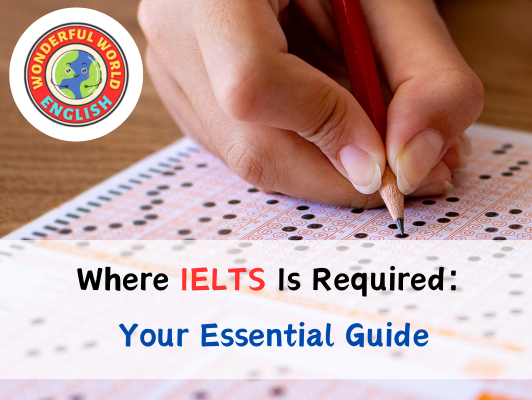Contents
Toggle
Meet David De’ Ath, founder, editor, and writer at Wonderful World English. With his extensive background as an English teacher, David provides valuable insights and practical tips on ESL for students and teachers alike.
The International English Language Testing System, commonly known as IELTS, serves as a standardized measure of English language proficiency for non-native English speakers.
It is recognized and required by educational institutions, employers, professional bodies, and immigration authorities worldwide, making it an essential prerequisite for individuals aiming to study, work, or migrate to English-speaking countries.
The IELTS test evaluates a test taker’s abilities in listening, reading, writing, and speaking through two test formats: Academic and General Training, each catering to different objectives and requirements.
IELTS is widely regarded for its rigor and global acceptance. Universities often necessitate the IELTS Academic test for admission into undergraduate and postgraduate programs to ensure that prospective students possess the language skills needed for an academic environment.
Similarly, governments and professional associations rely on the IELTS General Training test as part of their immigration and professional certification processes, respectively.
These entities acknowledge the test as a reliable indicator of an applicant’s ability to communicate effectively in an English-speaking context.
Due to the test’s high standards, preparation for IELTS can be comprehensive, focusing on practical language application rather than theoretical knowledge alone.
Key Takeaways
- IELTS is a critical language proficiency test for non-native English speakers who aspire to study, work, or live in English-speaking regions.
- Academic and General Training versions of IELTS address specific requirements of academic institutions and immigration/professional bodies.
- The test’s global acceptance stems from its comprehensive assessment of practical communication abilities in English.
IELTS Overview and Requirements
The International English Language Testing System serves as a standardized measure of English proficiency for study, work, and migration purposes, with distinct score requirements depending on the intended use.
Significance of IELTS Scores
IELTS scores are crucial as they are a common requirement by universities, institutions, and employers to gauge an individual’s English language skills.
Scores are reported as band scores on a scale from 1 to 9 across four skill areas: listening, reading, writing, and speaking.
Various entities may require different minimum scores which typically range from band 4 to 7.5, depending on the level of English proficiency they deem necessary.
For instance, higher education institutions often require a minimum score of 6.5 overall, with no individual section lower than 6.0, to ensure candidates can effectively participate in academic activities.
Related: What is a Good IELTS Score? Understanding the Scoring System
Differences Between IELTS Academic and IELTS General Training
IELTS is divided into two types: IELTS Academic and IELTS General Training.
The IELTS Academic test is designed for prospective students seeking study at an undergraduate or postgraduate level, and for those seeking professional registration.
It reflects the features of academic language and assesses whether a candidate is ready to begin studying or training in an environment where English is the language used.
On the other hand, IELTS General Training is suitable for individuals planning to undertake non-academic training, gain work experience, or for migration purposes to countries such as Australia, Canada, and the UK.
This version of the test focuses more on basic survival skills in broad social and workplace contexts.
Both tests provide a valid and accurate assessment of the four language skills, but the content, context, and purpose of the tasks differ to reflect their respective use.

IELTS Utilization by Countries and Sectors
IELTs is recognized globally, serving as a standard for English proficiency in academic, professional, and migratory contexts.
With a diverse range of entities like governments, universities, employers, and professional associations relying on IELTS, its scope is extensive.
IELTS for Study, Work, and Immigration
IELTS scores are crucial for individuals planning to study, work, or migrate to English-speaking countries like the UK, Canada, Australia, New Zealand, and the USA.
Educational institutions such as universities and colleges often require a minimum IELTS score for admission.
For instance, many top Canadian universities require at least 5.5 in each section and 6.0 overall.
Employment opportunities may also hinge on language proficiency, with various employers and professional associations using IELTS scores to assess the English capabilities of prospective employees.
Regarding immigration, IELTS scores are part of the eligibility criteria for various visa categories, including those under express entry and other global migration programs.
Acceptance of IELTS Scores by Institutions
Many renowned universities across the UK, Canada, Australia, New Zealand, and the USA accept IELTS scores, reflecting the examinee’s English language proficiency.
The acceptance levels vary, with different educational institutions setting their minimum IELTS requirements.
For working professionals, attainment of specific IELTS scores can be a pre-requisite for membership or registration in various professional associations within these countries.
For some insights into how you can send IELTS scores to higher education institutions, the guide below has you covered!
Related: How to Send IELTS Score to Universities: Step-by-Step Guide
IELTS for Visa and Citizenship Applications
IELTS plays a significant role in visa and citizenship applications.
Immigration authorities like Citizenship and Immigration Canada and UK Visas and Immigration require set IELTS scores for eligibility.
In Australia, for example, the Temporary Skill Shortage visa necessitates a minimum overall score of 5.0. Meanwhile, the Temporary Graduate visa demands an overall score of at least 6.0.
These scores help ensure that applicants can integrate into their new environment effectively.
Additionally, certain immigration programs, such as Canada’s Express Entry, use IELTS results as part of their comprehensive ranking system.

Conclusion
In conclusion, the International English Language Testing System (IELTS) is a crucial tool for individuals aiming to study, work, or migrate to English-speaking countries.
With its stringent evaluation of language skills through both the Academic and General Training tests, IELTS equips non-native speakers with a reliable measure of their English proficiency.
This standardization is recognized globally by educational institutions, professional bodies, employers, and immigration authorities, which use IELTS scores to assess candidates’ abilities to effectively communicate in English.
Consequently, achieving a good score on the IELTS can open doors to numerous opportunities across the globe, enhancing personal, academic, and professional growth.
Whether for academic pursuits, professional licensing, or migration, IELTS remains a pivotal step for millions looking to expand their horizons in English-speaking environments.
We hope you find value in this information; you can contact us if you require any support.
Have a wonderful day!
Image Attribution: All images licensed via canva.com





